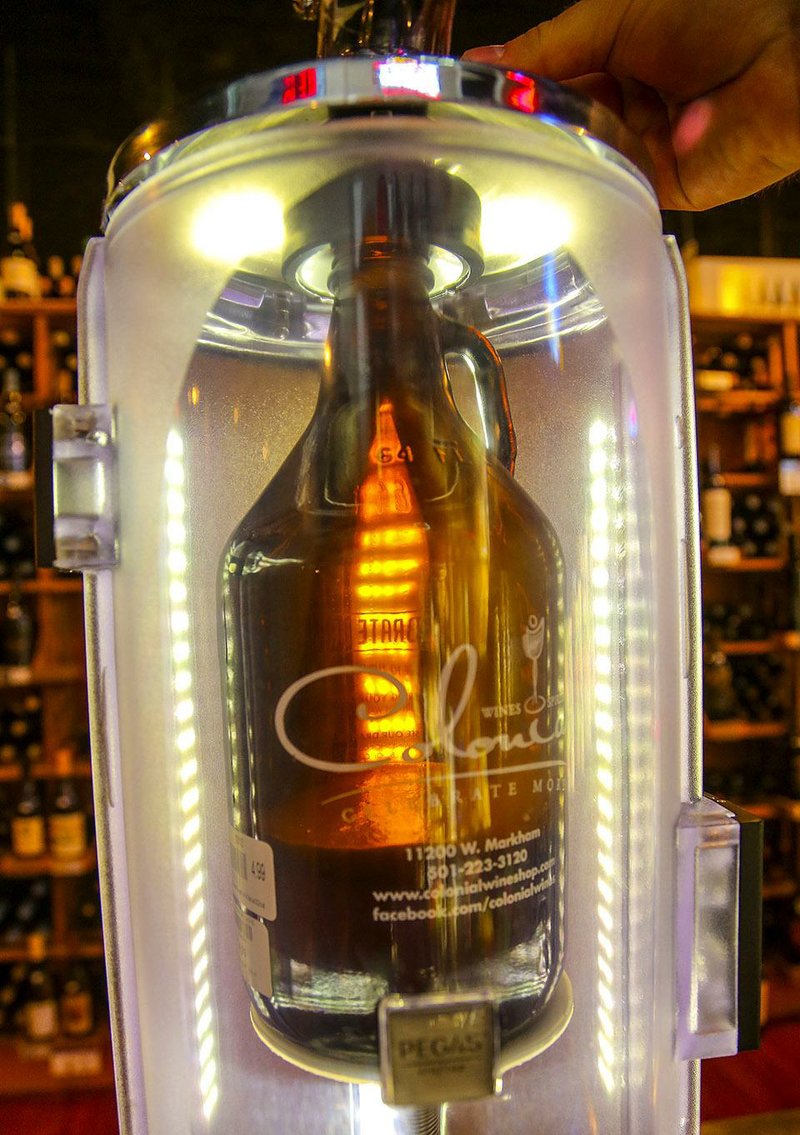Buying beer by the growler at retailers is proving a popular option in Arkansas with both stores and in-state breweries reporting brisk sales.
“We knew it was going to be big, but I mean we’ve been blown away by the response we’ve gotten,” said Colin Maxwell, beer manager for Colonial Wines and Sprits in Little Rock.
Beginning in July, retailers could get a state permit allowing them to install “growler stations” where 32- or 64-ounce containers could be filled from kegs for off-premises consumption.
To meet demand, the employees at 107 Liquor on West Kiehl Avenue in Sherwood typically change out a keg per day to keep beer flowing at its eight-tap station, said owner John Crow.
Growlers enable consumers to get both hard-to-find craft beers as well as a product with better flavor and value, Crow said. Metal kegs prevent the beer from degrading from light, he said. And since kegged beer is typically kept cold, it doesn’t see the temperature changes that bottled or canned beer might be subjected to which can affect taste.
Prior to the rule change, growler sales were limited to brew pubs and microbreweries. The new rule allows grocery stores, convenience stores, and bars with retail beer or native retail beer permits to fill growlers for off-premises consumption.
Currently, 21 retailers, including both liquor and convenience stores, have permits for growler stations, said Michael Langley, director of the state Alcoholic Beverage Control administrative division.
While exact sales figures are unavailable, Langley said the good response reflects both the demand for regional craft beers as well as growing number of Arkansas-based microbreweries.
“Many of them don’t produce anything but kegs” of beer, he said. “It has created another retail outlet for them to make their product available.”
Langley said growler sales give beer drinkers access to beers on tap at a bar that were otherwise unavailable.
“Now they run into it in their local liquor store on tap, they pick it up and take it home for a dinner party and can share that with other people, and that’s growing the market,” Langley said.
Maxwell said growler beer sales have been a “huge market for years in other parts of country. We’re kind of finally catching up.”
He expects consumer demand will continue as long as retailers with growler stations focus on offering specialty beers or brews not broadly available in the market.
Both Maxwell and Crow said they want to offer Arkansas-brewed beer as much as possible. But both noted that in-state breweries typically are small with limited production capacity.
“To the extent they’ve been available, we’ve definitely kept Arkansas stuff on the taps,” Crow said. While bottling and canning operations are expensive, there’s nothing to stop a small brewery from selling kegs of beer to retailers, he said.
“As much as I would like to dedicate several taps full time to Arkansas products, there’s not that much capacity right now,” Crow said. Keeping Arkansas brews available means talking with the brewers to see what’s available, he said.
“Things are booming on the local craft beer scene and we will carry as much of it as we can if they can sell it to us,” Crow said.
Colonial also tries to keep Arkansas brews on tap. Fossil Cove in Fayetteville is one popular brand, Maxwell said. Another is Moody Brews, a new offering from Josiah Moody, the former brewmaster at Vino’s Brew Pub in Little Rock. “We’ve gone through seven or eight kegs of that since Friday.”
The founders of two of the state’s largest brewers, Diamond Bear Brewing Co. in North Little Rock and Core Brewing & Distilling Co. in Springdale, said growler sales are helping them reach new consumers.
“The beers that I see at the growler station for the most part are smaller chains and local beers,” said Russ Melton, president of Diamond Bear. “I think there’s more opportunities for small breweries in this than there are for the big guys. And especially if somebody doesn’t package, bottle or can their beer, this gives them an outlet.”
Diamond Bear, which completed its move to a larger brewery and restaurant earlier this year, bottles its beer and now offers some beer in cans in addition to keg sales to bars, restaurants and retailers. Melton said he’s been pleased so far with the access his beers have had to growler station taps. He also sells growlers at his restaurant.
“For customers to have access to tap beer in their liquor store is pretty darn sweet,” said Jesse Core of Core Brewing. “I don’t think it’s going to cannibalize business of package products.”
Core, who sells growlers at his taproom, said he’s about to order another 1,000 growlers to meet demand.
He said he’s seen a trend where people come in after work, have a pint as they decompress, get their growler filled and go home.
“That seems to be a pretty routine thing to my customers.”
